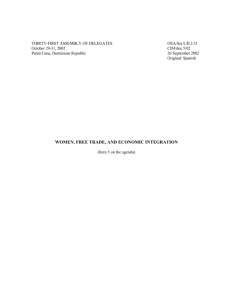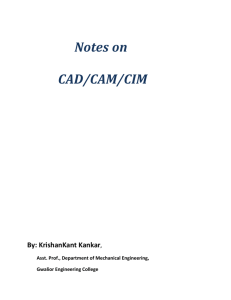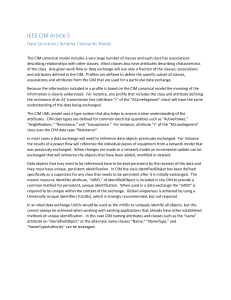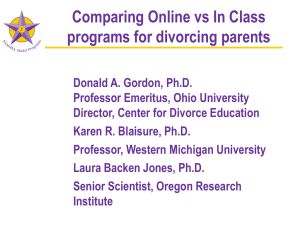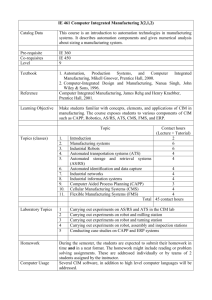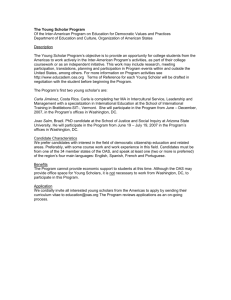CP/doc. 3779/03 - Organization of American States
advertisement
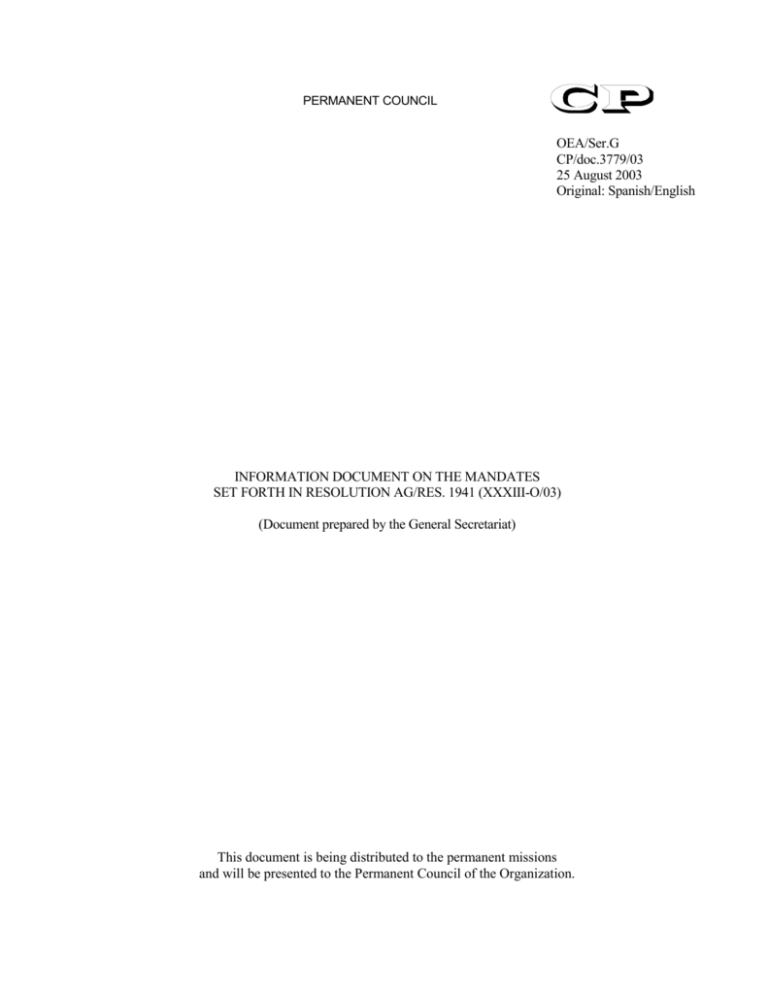
PERMANENT COUNCIL OEA/Ser.G CP/doc.3779/03 25 August 2003 Original: Spanish/English INFORMATION DOCUMENT ON THE MANDATES SET FORTH IN RESOLUTION AG/RES. 1941 (XXXIII-O/03) (Document prepared by the General Secretariat) This document is being distributed to the permanent missions and will be presented to the Permanent Council of the Organization. ORGANIZATION OF AMERICAN STATES INTER-AMERICAN COMMISSION OF WOMEN No. 08-047/03 August 22, 2003 Excellency: I have the honor to address Your Excellency in connection with your note dated August 5, 2003, on the report to be presented to the Permanent Council on September 10 for consideration, in particular as it pertains to operative paragraph 3.b of resolution AG/RES. 1941 (XXXIII-O/03). In this regard, I have attached hereto the document prepared by this Permanent Secretariat containing proposals for carrying out more effectively the mandate set forth in the aforementioned resolution as well as information regarding preparations for the Second Meeting of Ministers or of the Highest-Ranking Authorities, referred to in operative paragraph 7.a of the same resolution. Accept, Excellency, the renewed assurances of my highest consideration. Carmen Lomellín Executive Secretary His Excellency Ambassador Raymond Valcin Permanent Representative of Haiti and Chair of the Permanent Council Organization of American States Washington, D.C. Attachment iii PROPOSAL OF THE INTER-AMERICAN COMMISSION OF WOMEN TO FULFILL PARAGRAPHS 3.b and 7.a OF RESOLUTION AG/RES. 1941 (XXXIII-O/03), PROMOTION OF WOMEN HUMAN´S RIGHTS AND GENDER EQUITY AND EQUALITY I. BACKGROUND In April of 2000, in fulfillment of the mandate issued in resolution AG/RES. 1625 (XXIXO/99), “Status of Women in the Americas and Strengthening and Modernization of the InterAmerican Commission of Women,” the OAS convened the “Meeting of Ministers, or of the HighestRanking Authorities Responsible for the Advancement of Women in the Member States”. At that meeting, the ministers adopted the Inter-American Program on the Promotion of Women’s Human Rights and Gender Equity and Equality (IAP). The Inter-American Program was submitted to the XXX General Assembly of the OAS held in Windsor, Canada, where it was adopted by way of resolution AG/RES. 1732 (XXX-O/00), “Adoption and Implementation of the Inter-American Program on the Promotion of Women’s Human Rights and Gender Equity and Equality” and was subsequently endorsed in the Plan of Action of the 2001 Quebec Summit of the Americas as an effective tool for gender mainstreaming. It is a program that provides a new and comprehensive approach to integrating the gender perspective both within the inter-American system and in the member countries. It is intended to support the efforts of OAS member states and inter-American organizations in the systematic integration of a gender perspective into their policies, programs, and strategies. Moreover, it is a tool for achieving gender equity and equality in all spheres of public policy. II. MANDATES The IAP contains numerous recommendations for the member states on the integration of a gender perspective in public policy, as well as mandates for the OAS General Secretariat and the CIM. The program specifically mandates that the OAS General Secretariat “Adopt, in coordination with the CIM, the measures needed to integrate the gender perspective into the execution of programs and activities by all organs, agencies, and entities of the OAS, and promote the incorporation of this perspective into the work of the agencies of the inter-American system.” (IAP 2.1.3) Since its approval in 2000, the IAP has quickly become the blueprint for CIM’s programmatic activity. In compliance with the mandate to “Ensure that a gender perspective in consistently mainstreamed into the preparation and application of international instruments, mechanisms, and procedures within the framework of the OAS, and particularly on the agendas of ministerial-level meetings” (IAP 2.1.2), the CIM has instituted a process to develop recommendations to the various ministerials and to follow-up on these recommendations. Entitled SEPIA (Spanish language acronym for Follow up to the Inter-American Program), the CIM has worked with civil society experts to follow-up on the gender mainstreaming recommendations presented to the Ministries of Labor (2001), Justice (2002) and Education (4th quarter, 2003). The civil society experts, in partnership with the governments, reviewed the recommendations made to the ministries, analyzed -2- the resulting plan of action/declaration, and then developed recommended lines of action for presentation to said ministries. III. SECOND MEETING OF MINISTERS OR OF THE HIGHEST-RANKING AUTHORITIES RESPONSIBLE FOR THE ADVANCEMENT OF WOMEN IN THE MEMBER STATES (REMIM II) In 2004, the OAS will convene the Second Meeting of Ministers or of the Highest-Ranking Authorities Responsible for the Advancement of Women in the Member States (REMIM II). The tentative dates for the meeting are April 22-24. The preliminary draft agenda is still under discussion and consideration by the CIM Executive Committee and will be approved at their meeting in late November/2003. The proposed agenda items for discussion by the Heads of Delegation are: IV. Reports of the Member States on implementation of the Inter-American Program on the Promotion of Women’s Human Rights and Gender Equity and Equality Women, Free Trade and Economic Empowerment Gender Equity and Equality in the Fourth Summit of the Americas Commemoration of the 10th Anniversary of the Convention of Belém do Pará. 75th ANNIVERSARY OF CIM In February of 2004, the CIM concludes a year-long commemoration of its 75th anniversary. The CIM was established in 1928 as a result of negotiations between women’s organizations and governments of the 6th International Conference of American States, to increase the participation of women at the Inter-American arena. Since that time, the CIM has fought for the rights of women, guarded their interests and promoted their progress. It is the first official intergovernmental agency in the world created expressly to ensure recognition of the civil and political rights of women Throughout its history, the CIM has been in the vanguard in promoting the fundamental rights of women, and in the struggle to extend effective suffrage to the women of the Americas. At the 7th International Conference of American States in Montevideo (1933), it was instrumental in the approval of the Convention on the Nationality of Women, which enabled a woman to retain her own nationality in the event of marriage to a man of another nationality. In 1948, in Bogotá, it led the way for the adoption of the Inter-American Conventions on the Granting of Political and Civil Rights to Women; and, with the 1994 Inter-American Convention on the Prevention, Punishment, and Eradication of Violence against Women, CIM aggressively pursued the violence that is so pervasive globally, and is kept hidden – Violence against Women. -3- V. RECOMMENDATIONS CIM recommends to the Permanent Council that, in compliance with the mandates of AG/RES 1941(XXXIII-O/03), it conclude the 75th Anniversary Year of CIM by convening a Special Session of the Permanent Council to review the mandates of the IAP, specifically those mentioned in said resolution, which states: “To Request the Permanent Council, in fulfillment of the mandates of the Summit of the Americas and the Inter-American Program, to consider convening a special meeting, in conjunction with the CIM and with the participation of civil society organizations, in order to move forward with the implementation of the Inter-American Program in the member states;” Additionally, this meeting would review the progress of the IAP since its inception, and would develop recommendations on how it can be most effectively implemented and monitored in the member states. Coordinated by the Ambassadors, Permanent Representatives to the OAS, and the CIM, this meeting would also count on the participation of experts in the area of gender and public policy, and would provide very valuable input into the Second Meeting of Ministers or of the HighestRanking Authorities Responsible for the Advancement of Women in the Member States to be held in April, 2004. CIM suggests that this meeting be held the day before the February, 2004 Session of the CIM Executive Committee. In addition to the members of the Committee, many of the CIM delegates will be in attendance. CIM recommends that the Permanent Council host a series of panel discussions at this meeting focusing on the integration of a gender perspective, as mandated by the IAP, on predetermined public policy issues. Given the facts that the top three Millennium Development Goals, which are also part of the Declaration of Santiago, are: 1) the eradication of extreme poverty and hunger; 2) the achievement of universal primary education, and 3) the promotion of gender equality and the empowerment of women, CIM suggests that the issues covered be labor, education and trade, since policies developed in these areas can effectively eradicate poverty, achieve universal primary education and promote true gender equality. In addition, two of the main agenda items for discussion by the Heads of Delegations at the above-mentioned 2004 Ministerial will be “Women, Trade and Economic Empowerment”, and “Actions Taken to Implement the IAP.” CIM further recommends that available technologies be utilized as a practical and costeffective method of achieving the desired results. CIM recently had a very positive experience with the use of a teleconference on “Women, Peace and Security”, where we were able to connect to four sites outside of Washington D. C. VI. PARTICIPATION OF CIVIL SOCIETY Civil society organizations and non-governmental organizations (NGOs) have very often lead the way in innovation and creativity, transforming the realm of public policy. Increasingly, they’ve lent their voices and expertise to policy makers at the local, national and international levels. In the Inter-American system, the Summit of the Americas process has clearly defined the parameters for the inclusion of civil society in the development of effective programs, policies and activities. If the implementation of the IAP in the member states is to be successful and effective, if there is to be the integration of gender in the development and implementation of public policy in the member states, there has to be effective, targeted, consistent and sustained follow-up, and it is vital -4- that civil society organizations be invited as partners throughout the implementation process of the IAP. Since the Summit of the Americas Secretariat has so successfully engaged civil society in policy dialogue, CIM suggests that this office be invited to participate in this meeting. VII. EXPECTED OUTCOMES In addition to fulfilling the mandates of AG/RES 1941 (XXXIII-O/03) and of the InterAmerican Program on the Promotion of Women’s Human Rights and Gender Equity and Equality, the results of this proposed Special Session of the Permanent Council, jointly with the CIM, would place an increased emphasis and visibility on the role of gender in public policy development, and, as stated above, provide input in to the 2004 Meeting of Women Ministers, and to the CIM. This meeting could also serve to receive valuable, realistic and practical input from the Permanent Council, the CIM and the representatives of civil society on the integration of a gender perspective on very key issues affecting the men and women of our hemisphere. CP11725E04
